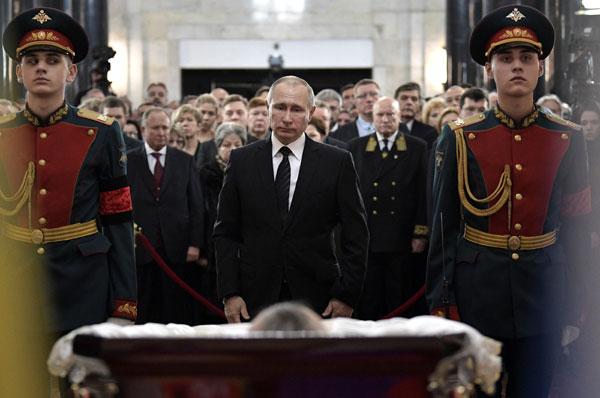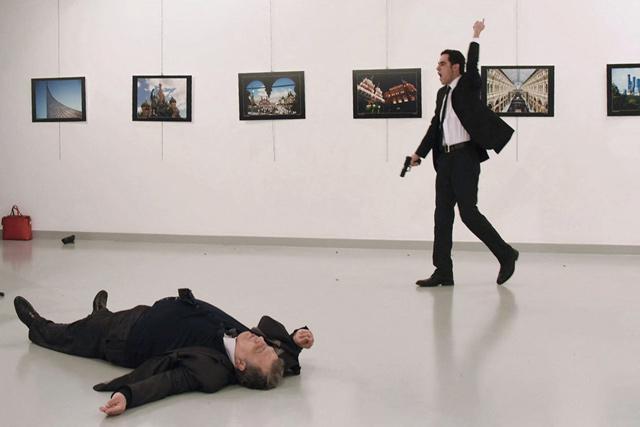You are here
Turkey trial opens into Russian ambassador's 2016 killing
By AFP - Jan 08,2019 - Last updated at Jan 08,2019

Turkey trial opens into Russian ambassador's 2016 killing in Ankara on Tuesday (AFP photo)
ANKARA — A trial into the 2016 murder of a Russian ambassador opened in Ankara on Tuesday with the first two of 28 defendants to be heard denying any links to the assassin.
Andrei Karlov, 62, was shot dead by an off-duty Turkish policeman at a photo exhibition in Ankara on December 19, 2016, in a shock attack that was captured on camera by photographers attending the event.
The 22-year-old gunman, Mevlut Mert Altintas, shouted ‘‘Allahu akbar’’ (God is greatest) and ‘‘Don't forget Aleppo’’, vowing that those responsible for events in Syria would be held accountable.
Turkish special forces killed Altintas shortly afterwards.
On Tuesday the two defendants denied any links to Fethullah Gulen, a US-based Islamic preacher seen as an arch-foe of President Recep Tayyip Erdogan, and whom Ankara blames for a July 2016 coup attempt.
The pair, who had attended the same police academy as Altintas, denied being friends with him.
They are accused of belonging to a terror group.
Bilal Dereli, 26, told the court he had never been in the same class as Altintas and knew him only by sight, while Oguzhan Ozturk, 28, also denied being friends with the killer.
‘‘I got into police school on the third attempt. If I had a link [to Gulen], I would have immediately been successful,’’ Dereli added.
Dogukan Soylemez, a 26-year-old classmate of Altintas and a former security officer for the health minister, insisted he had no links with Gulen either while at school or in his working life.
Gulen denies
murder link
The Ankara prosecutor has charged 16 defendants with ‘‘premeditated murder with the intention of causing terror’’, according to the indictment. Another 12 have been charged with ‘‘belonging to a terror organisation’’.
Thirteen are currently in pre-trial detention, while five suspects are on conditional release and appeared in court Tuesday. Six others are being tried in absentia.
Four suspects appeared in court via video conference while nine were under gendarmerie protection in the courtroom.
Gulen, who has denied links to both the failed coup and the murder, was among those not in attendance.
Turkey refers to Gulen's organisation as the Fetullah Terrorist Organisation (FETO), but followers say it is peaceful, promoting secular education.
‘Hot war’ risk
Penalties sought by the prosecution include aggravated life sentences, which have replaced the death penalty in Turkey and carry harsher conditions than normal life imprisonment convictions.
The indictment says the Gulen movement plotted the murder of Karlov, who had been appointed as ambassador in 2013, to "break off bilateral relations" between Turkey and Russia and bring them to the brink of ‘‘hot war’’.
‘‘This murder took place on the eve of a meeting of Russian, Turkish and Iranian foreign ministers on the topic of discussing a peace settlement in Syria,’’ Karlov's wife Marina said.
‘‘I think that the aim of this murder was to wreck those talks and worsen relations between Russia and Turkey,’’ she told Rossiya-24 television.
Turkey and Russia had a dramatic falling out in November 2015 after a Turkish fighter jet shot down a Russian warplane along the Syrian border.
Related Articles
ISTANBUL — President Recep Tayyip Erdogan on Wednesday said the killer of Russia's ambassador to Turkey was a member of the group of Fethull
MOSCOW — Russia on Thursday laid to rest its envoy Andrei Karlov after a packed memorial ceremony in Moscow for the diplomat who was assassi
ANKARA — A Turkish court on Tuesday sentenced five men to life in jail for the 2016 murder of a Russian ambassador by a gunman who sought ve


















